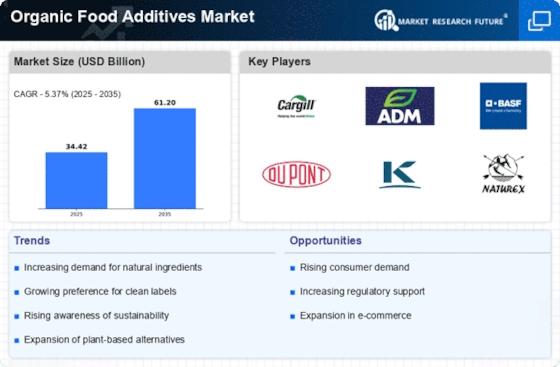Top Industry Leaders in the Organic Food Additives Market

The organic food additives market has witnessed significant growth in recent years, fueled by increasing consumer awareness and demand for healthier and sustainable food options. This burgeoning sector has attracted a diverse array of players, contributing to a dynamic and competitive landscape. This article delves into the key aspects of the competitive landscape, exploring the strategies employed by major players, factors influencing market share, emerging companies, industry news, and prevailing investment trends.
Key Players and Market Dynamics:
E.I. du Pont de Nemours and Company (US)
Archer Daniels Midland Company (US)
Cargill Inc. (US)
Chr. Hansen Holding A/S (Denmark)
Kerry Group Plc (Ireland)
BASF SE (Germany)
Novozymes A/S(Denmark)
Tate & Lyle (UK)
Danisco A/S (Denmark)
Givaudan (Switzerland)
Brenntag AG (Germany)
Firmenich SA (Switzerland)
Associated British Foods plc (UK)
International Flavors & Fragrances Inc. (US)
Foodchem International Corporation (China)
Strategies Adopted by Major Players: Major players in the organic food additives market adopt various strategies to strengthen their market position. These include mergers and acquisitions, partnerships, product innovations, and geographical expansions. For instance, companies like DuPont and Kerry Group focus on continuous research and development to introduce new and improved organic additives, catering to evolving consumer preferences. Strategic collaborations, such as Cargill's partnerships with local farmers and suppliers, enable enhanced supply chain management and ensure a steady flow of quality organic raw materials.
Factors Influencing Market Share Analysis: Several factors contribute to the market share dynamics of organic food additives. Quality, pricing, brand reputation, and distribution capabilities are crucial determinants. Companies that prioritize sustainable and transparent sourcing of organic ingredients often gain favor among environmentally conscious consumers. Moreover, regulatory compliance and certifications play a pivotal role in building consumer trust. Market share analysis also considers a company's ability to adapt to evolving consumer trends, such as the increasing demand for clean-label products and plant-based alternatives.
New and Emerging Companies: While established players dominate the market, new and emerging companies are making significant inroads. Start-ups like Naturex and Corbion are gaining attention for their innovative approaches to organic food additives. These companies often focus on niche markets or specific product categories, allowing them to carve out a unique identity. The agility of these newcomers enables them to quickly respond to emerging trends and capitalize on gaps in the market left by larger competitors.
Industry News and Innovations: Staying abreast of industry news is crucial in understanding the competitive landscape. Recent developments include advancements in organic food additive technologies, strategic alliances, and product launches. For instance, news of a major player investing in cutting-edge processing technologies or securing partnerships with sustainable agriculture initiatives can significantly impact market dynamics. Innovations in organic preservatives, colorings, and flavorings are particularly noteworthy, reflecting the industry's commitment to meeting consumer demands for clean-label and minimally processed products.
Current Company Investment Trends: Investment trends in the organic food additives market reflect the industry's growth trajectory. Companies are allocating resources to expand production capacities, enhance research and development capabilities, and strengthen their presence in key geographic regions. Investments in sustainable and eco-friendly practices, such as renewable energy sources and waste reduction initiatives, align with consumer expectations and regulatory standards. Additionally, strategic investments in marketing and branding activities help companies differentiate themselves in a crowded market.
Overall Competitive Scenario: The competitive scenario in the organic food additives market is characterized by a balance between established players and nimble newcomers. Established companies leverage their scale and resources to maintain market dominance, while emerging players bring innovation and agility. The market's growth is fueled by evolving consumer preferences for clean-label and organic products, prompting companies to continually refine their strategies. As the industry matures, collaborations and partnerships become integral, fostering a symbiotic ecosystem where companies mutually benefit from shared expertise and resources.
Recent News :
Several key players dominate the organic food additives market, each employing distinct strategies to gain a competitive edge. Companies such as Cargill, Archer Daniels Midland Company (ADM), Kerry Group, DuPont, and Sensient Technologies Corporation are among the prominent players. These industry giants are strategically positioned to capitalize on the growing demand for organic food additives. They leverage their extensive distribution networks, research and development capabilities, and established brand reputation to maintain a stronghold in the market.











